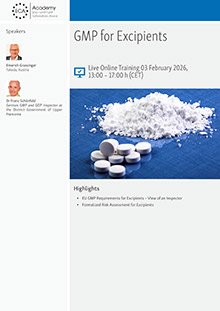A NEW CHANCE FOR AN MRA?
In the past years, the FDA world has changed. And according to Dara Corrigan, Assistant Commissioner for Global Regulatory Policy, "they still move on". One of the biggest steps was the setup of foreign offices throughout the GMP world. The FDA realised that there was a need "to do more foreign inspections in high-risk areas". So, most of these offices were staffed with GMP inspectors to foster enforcement activities in countries like China or India. In the EU the situation was different. Although many human drug GMP inspections are still performed in the EU (e.g. Germany is No. 3 after India and China), the offices in Europe were opened to co-operate and to "work share regulator-to-regulator" with the EU regulatory agencies. As other agencies, the FDA needs to "use finite resources efficiently". One office was opened in London with Janice Soreth who represented a connection to the European Medicines Agency (EMA) for some years. The main office in the EU region was opened in Brussels. Up to now this office was headed by Dara Corrigan. As she said, opening the office was a huge step for the FDA but also for her. Before moving to Brussels with her family, she was heading FDA's inspectorate with approx. 4, 000 inspectors.
The first steps in terms of cooperation between the EU and the FDA were taken in the late 90s. Yet, the MRA that was signed in 1999 has never been implemented. The main barrier preventing its implementation were the different regulations in the US and in the EU with regard to the handling of conflicts of interest. This has always been a main issue in the US. There, inspectors are not allowed to have any interest in a company which could be subject to inspection. This means, for example, interest in company stocks. Even having a spouse or a relative working in a respective pharmaceutical company is an issue. In 2005 the legal framework changed in the EU and is now "more similar to the one in the US". However, an MRA has not been implemented yet. According to Dara, "a comparable public health protection is still a threshold" to meet the goal "to rely on each other's GMP inspections". So the strategic collaboration between the FDA and the EU for drug inspections has been going on for a while.

Recommendation
10/11 February 2026
Handling of Foreign Particles in APIs and Excipients - Live Online Training
A real push came with the planned implementation of the Transatlantic Trade and Investment Partnership (TTIP) currently discussed between the European Union and the USA. Although the FDA is not a trade related organisation, the question was raised why inspections and their outcome should not be recognised or even accepted. At the same time both sides were facing the same GMP challenges worldwide. Besides, drug shortages seem to have become a growing problem. Now, agencies have to focus on these areas and shift resources. Inspectorates should not "repeat work which has already been done". Dara and her team are working on this but they do not want to tell other countries in the EU what to do and what actions they should take. The FDA and the EU should both accept the "sovereign right to make own regulatory decisions". Benchmarking is currently performed with areas where agreements are already in place (like for example customs and the aviation industry).
But how can this mutual reliance be achieved? According to Dara, "a comparative assessment of laws, regulations, policies and practices is needed". The fact that the EU is comprised of 28 member states (with different languages and cultures) adds some complexity to the process, though. Besides, the risk of conflicts of interest and the sharing of confidential information between regulators constitute additional challenges. In the EU, inspection reports are not redacted whereas the FDA gives the EU inspectorates redacted reports. In the US, it is not allowed to disclose trade secret information.
Another step is to further explore and compare GMP inspections in the EU and the US (while looking at the differences among the EU Member States). In this process, the focus should be put on how inspections are done and managed within the inspectorate including resource planning, decision making and the review process. The qualifications of inspectors are different in various regions and this has to be acknowledged. The FDA has observed inspections in Sweden (but not directly participated), trying to better understand the processes and how the EU inspectorates rely on each other. Now, FDA inspectors might join inspections in Germany, maybe even as co-inspectors.

Recommendation
Heidelberg, Germany10/11 February 2026
Combination Products
The next steps will be the completion of the conflict of interest analysis and the decision on a policy for sharing unredacted inspection reports. Overall, the "relationship with trustable partners should be maximised". Dara believes that this will happen.
Author:
Wolfgang Schmitt
CONCEPT HEIDELBERG



